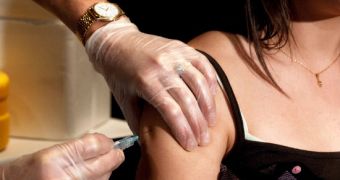Despite their being encouraged by both scientists and doctors to administer their daughters a vaccine against HPV (i.e. human papilloma virus), it appears that a growing number of parents are reluctant to do so.
Thus, a survey whose findings are thoroughly presented in the journal Pediatrics maintains that more than 2 in 5 parents are not yet willing to vaccinate their daughters against the aforementioned threat to their health.
According to EurekAlert, some of these parents are quite convinced that the vaccine is not as efficient as scientists would have us believe, which is why administering it is a rather futile endeavor.
Meanwhile, other parents frown upon the vaccine against HPV on account of its potentially having side effects that more than outweigh the benefits, and a third category simply lack sufficient knowledge with respect to this issue.
Commenting on these two attitudes towards said vaccine, Robert Jacobson, M.D., a pediatrician currently working with the Mayo Clinic Children's Center argued as follows:
“HPV causes essentially 100 percent of cervical cancer and 50 percent of all Americans get infected at least once with HPV. It's a silent infection. You cannot tell when you've been exposed or when you have it.”
“While most HPV infections clear, a percentage linger and start the process of cancerous changes. The HPV vaccine is an anti-cancer vaccine,” Robert Jacobson further explained.
Interestingly enough, it was only five years ago when roughly 40% of all parents admitted to being reluctant towards the idea of vaccinating their daughters against HPV.
Since then, said percentage has grown to roughly 44%. As Robert Jacobson puts it, “That's the opposite direction that rate should be going.”
Given the fact that the vaccine against HPC works best when administered at an early age, specialists urge that parents reconsider their views on the matter at hand and give it to their daughters while the latter are still young adolescents rather than older teens.

 14 DAY TRIAL //
14 DAY TRIAL //